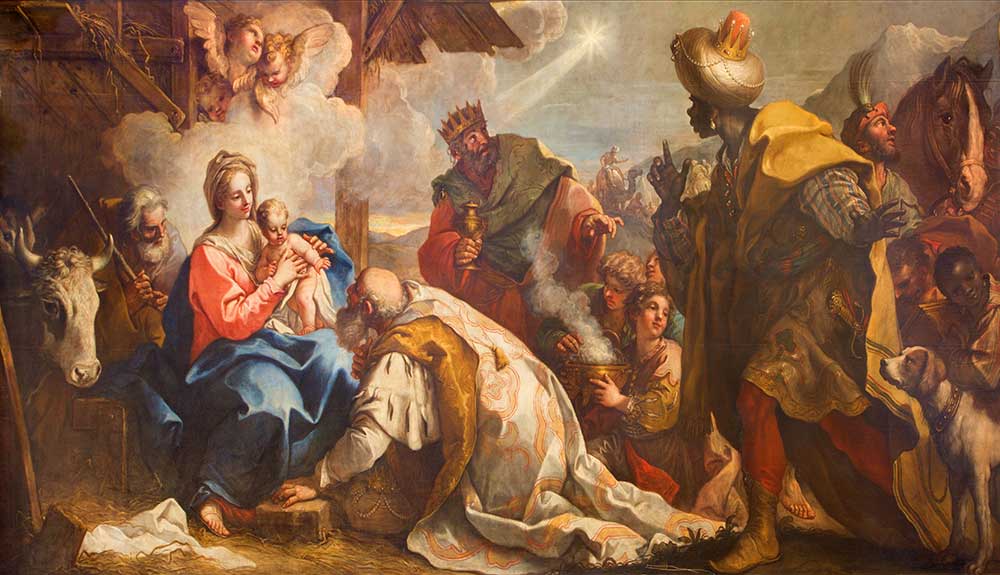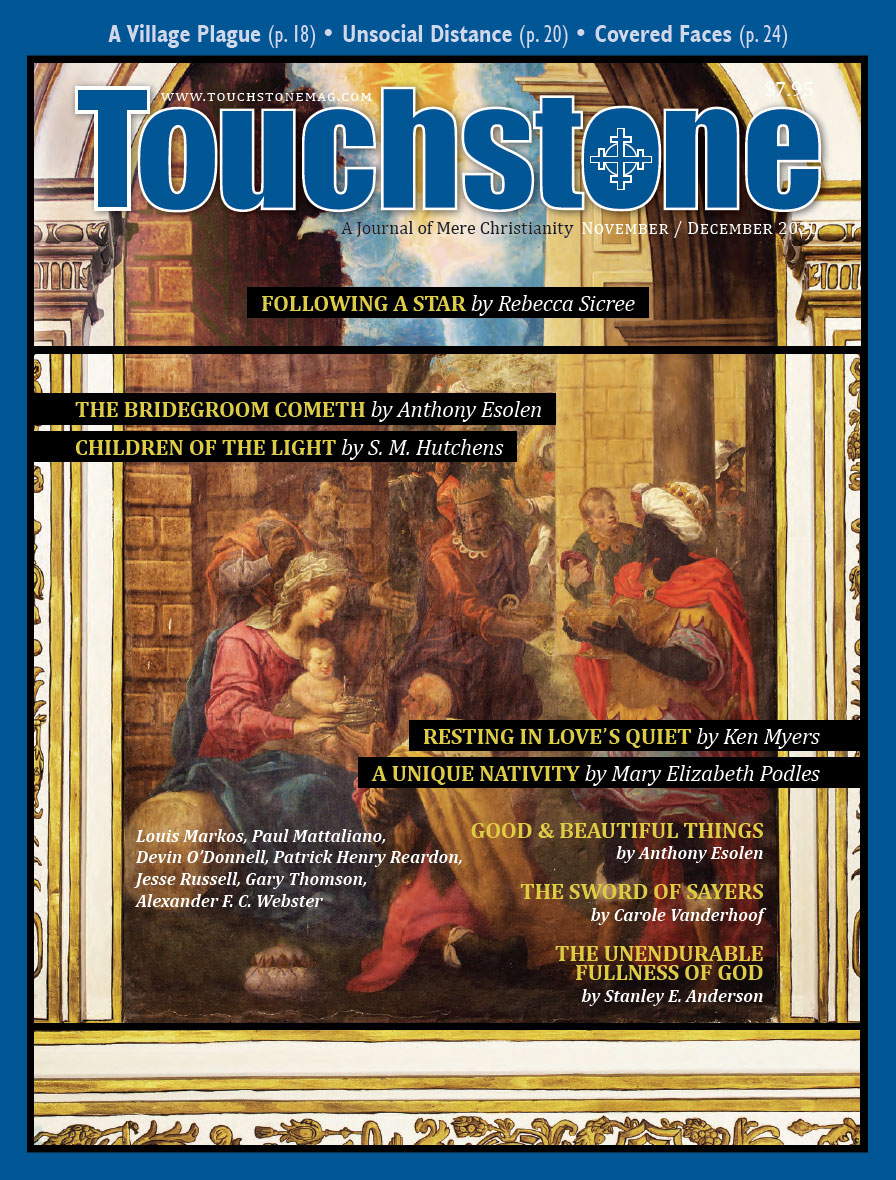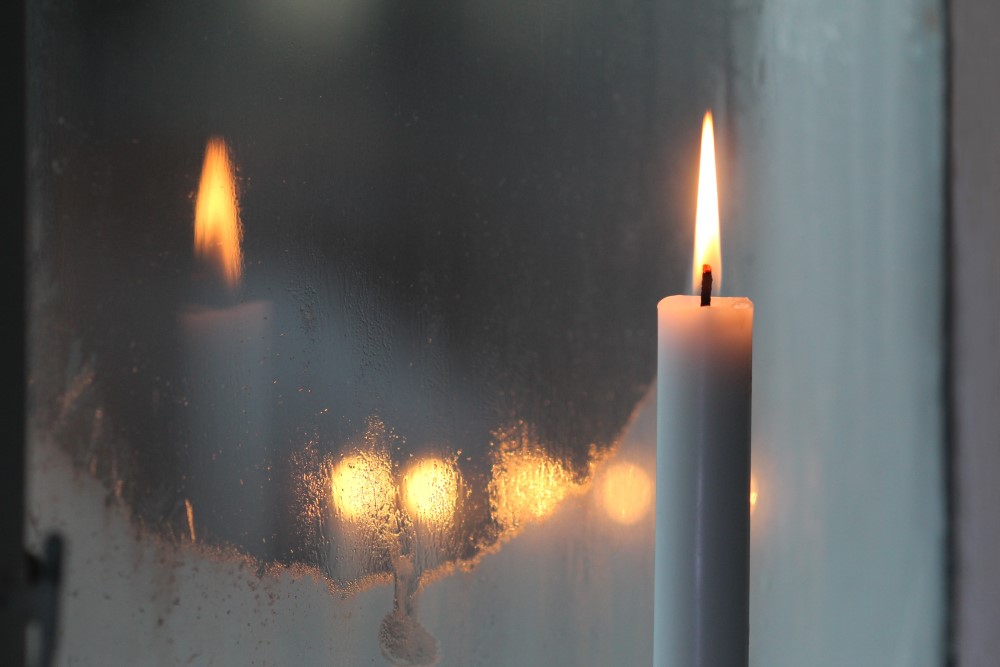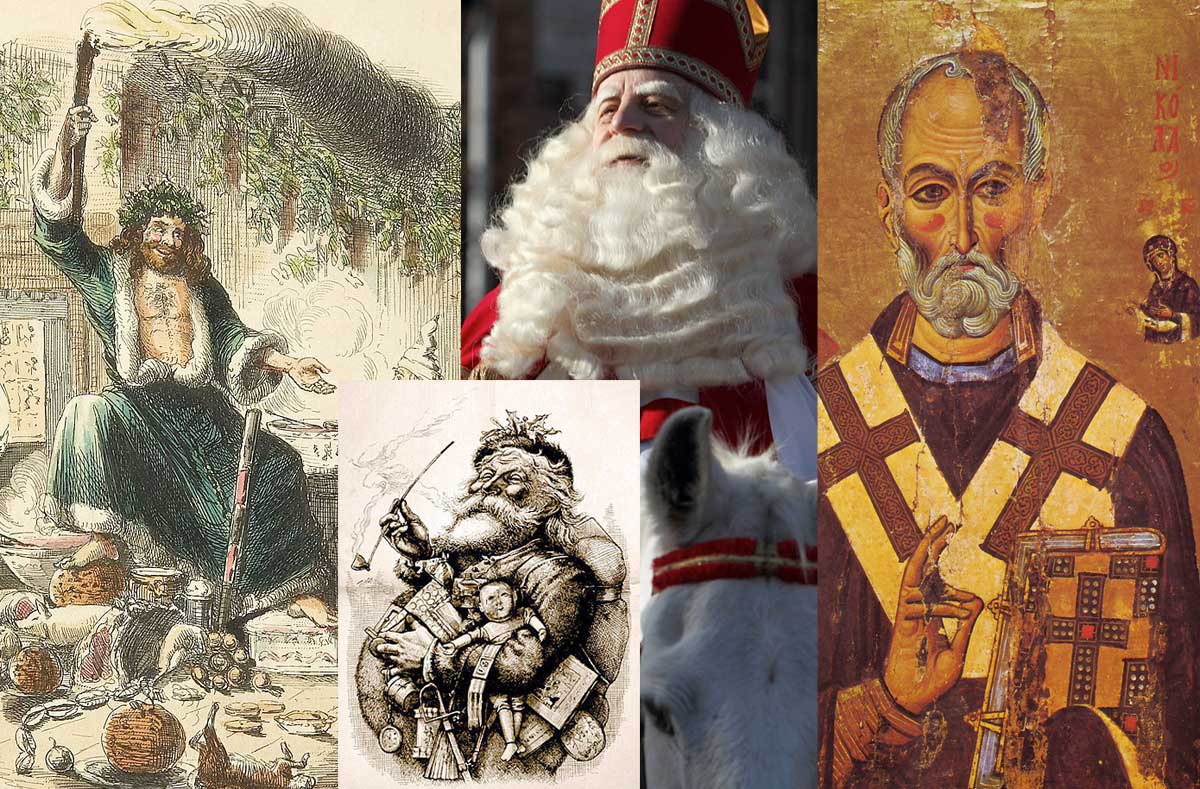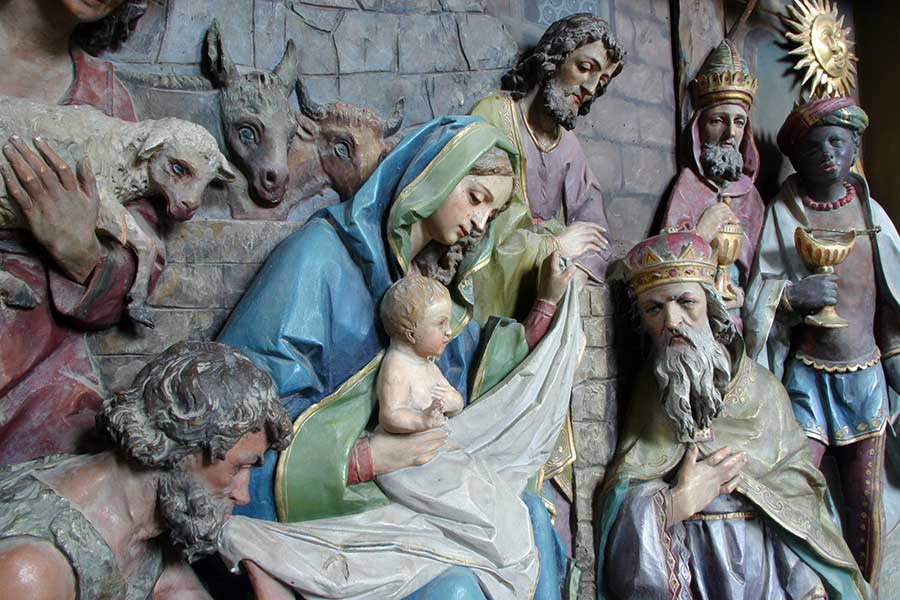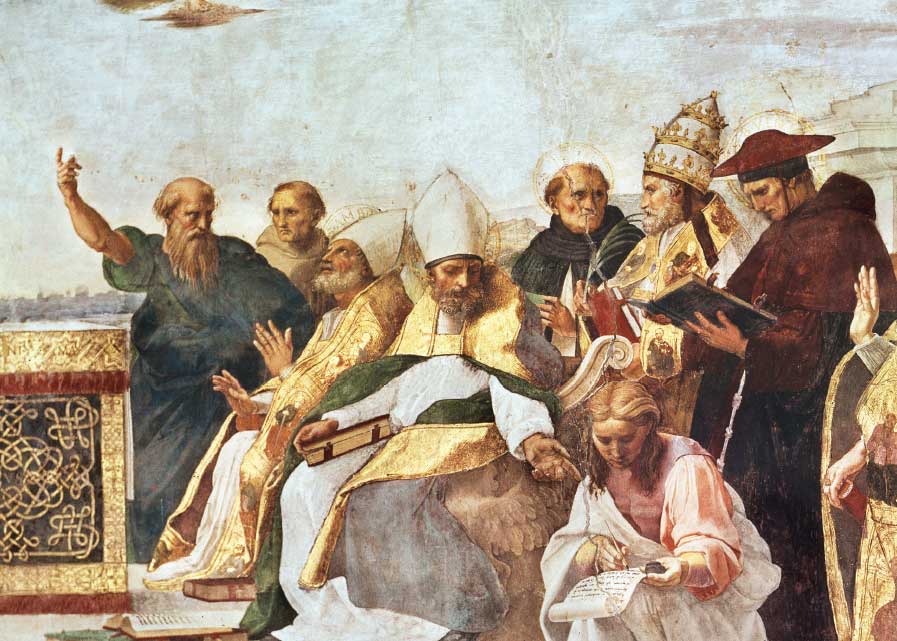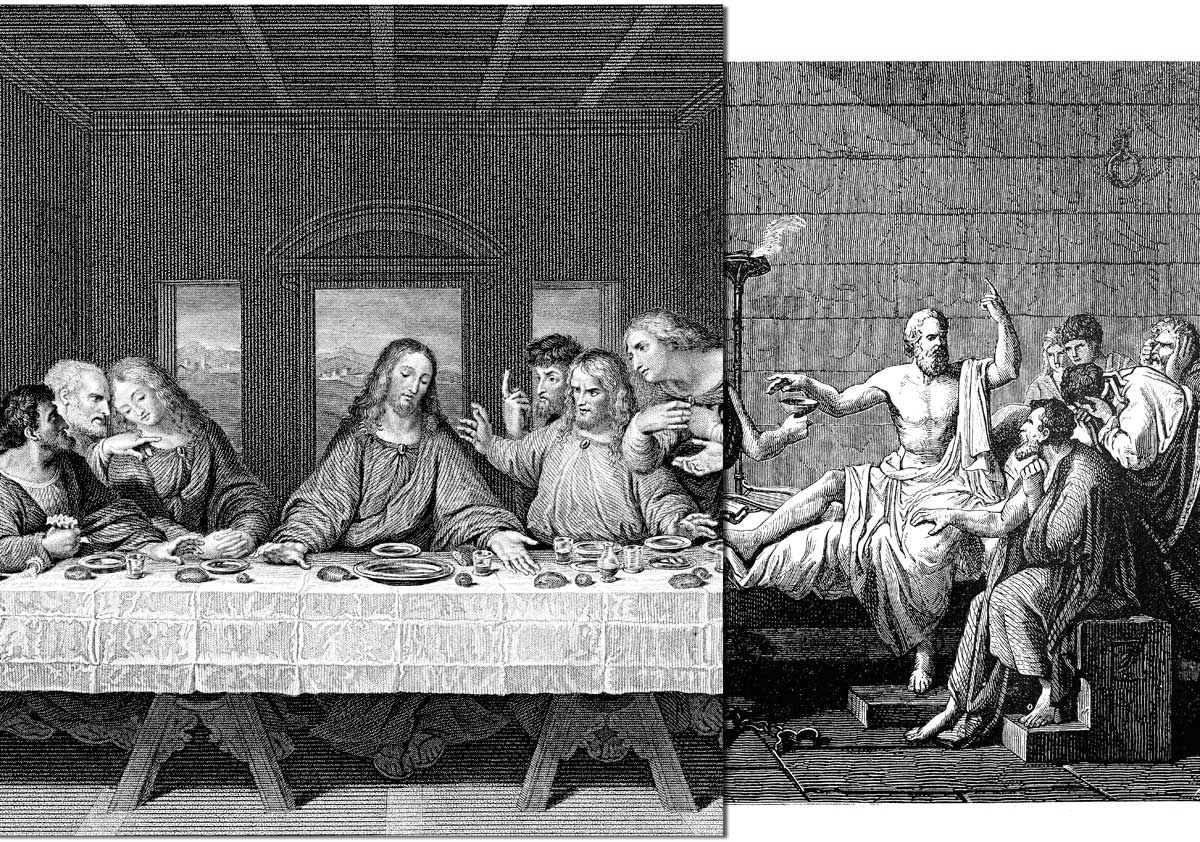View
Following a Star
Rebecca Sicree on the Quest of the Magi & Other Journeys
Walking with my daughters through downtown Bellefonte, a town that prides itself on its Victorian Christmas celebration, we passed a door in a wall down a red brick path. To this day, I cannot recall what drew us closer—maybe I was piqued because we couldn't read its sign from the street. Isabel ran over for a closer look. She wore a puzzled expression when she caught up with us.
"It says Quest Services," she reported. "Whatever that means."
The name fascinated us. Did Gandalf operate a consulting firm? Was an elderly Indiana Jones alive and well and working from central Pennsylvania? Maybe that door concealed a troop of dwarves ready to strike out toward the Edge of the Wild.
"Well," Teresa mused, "now we know who to call if we want to find the Holy Grail."
Fatal Attractions
Today we use the word quest for any lengthy search, even the search for a vaccine made by researchers who never leave their lab. But traditionally a quest was a journey undertaken to find something—or someone—hidden. In myths and folktales, the quest is so dangerous and difficult that success is impossible without supernatural assistance, whether from a goddess or a Grail maiden or just some good fairy. Some quests, like Jason's for the Golden Fleece, were meant to be death sentences.
In real life, quests can still be fatal. In 1925, the British explorer Percy Fawcett vanished, along with his son and his son's best friend, in the Amazon jungles while searching for the Lost City of Z. In the years since, Fawcett became the object of more quests than the City of Z itself. The lost explorers were never found—and neither were all the rescue parties.
So why are quests, dangerous as they are, so attractive to us? Maybe because, as St. Augustine wrote, our hearts are restless until they rest in God. Our lives, whether we realize it or not, are a quest—a quest for the hidden Kingdom of God.
Life Is a Journey
Christ himself gives us buried treasure and the fabulous pearl of great price—both objects worthy of a quest—as images for the Kingdom of God we should be seeking. But when I brought up the idea of life as a quest at home, my daughters all groaned.
"Not that life-is-a-journey business again!" they complained. "We hear that all the time in religion class." But when I asked them what they had learned, they couldn't remember anything.
I wonder if their teachers only told them the comforting parts of the life-is-a-journey business, such as "Heaven is your real home!" and "Jesus is your guide!" Though true, those parts seem bland and forgettable if you leave out the grimmer advice we travelers have been given—such as choosing the narrow way and avoiding the wide, well-trodden road that leads to destruction.
And staying alert for something prowling around that wants to eat us.
C. S. Lewis explains it best. "We are never safe, but we have plenty of fun, and some ecstasy," he writes in The Problem of Pain. "Our Father refreshes us on the journey with some pleasant inns, but will not encourage us to mistake them for home."
Three Quests
At Christmastime the three kinds of quests—the real-world expedition, the fairy-tale quest, and the moral journey of life—come together in the story of the Magi, found in Matthew's Gospel. Fr. Dwight Longenecker, in his book The Mystery of the Magi, makes a persuasive case that the "Magi from the east" were Arabs from the kingdom of Nabatea, a land immediately east of Judea. The Nabateans, he points out, were descended from Abraham, interested in astrology, and related to King Herod. And traditionally they paid tribute with gifts of gold, frankincense, and myrrh.
If the Magi were Nabatean astrologers, they may have set out from their capital of Petra (the hiding place of the Holy Grail in Indiana Jones and the Last Crusade). They probably started not on a quest, but on an ordinary diplomatic mission, bearing tribute from their king to Herod's newborn heir in Jerusalem, the newborn King of the Jews, whose birth had been heralded by a star. When they found that Herod's heir did not exist, they would have been horrified. Their well-meaning mission had become a political faux pas.
To my mind, the story then takes a sudden turn, as if a fairy tale had invaded the real world. The evil King Herod orders the Magi on a quest to find his newborn rival. To their joy, the star reappears and provides divine guidance. They find the Child and pay him homage.
Then the fairy tale turns into a parable. Warned in a dream of the king's plans, the Magi must choose between obeying the king and saving the Child. They choose to save Jesus, returning to their country by another route, doubtlessly taking the narrow road home. Then the Magi vanish from history, though not from our imaginations.
Every Catholic school has its Christmas pageant, and every pageant has its Magi, and every school boy secretly wants to be one of the Three Kings. It's cool to wear a crown and set out westward across the desert on a camel. Our youngest is now too old for a role in our parish's pageant—if there is one this year. It will be tragic if the Covid-19 quarantiners cancel Christmas—if for no other reason than that the story of the Magi ignites our imaginations and sends us off on the quest for Jesus.
The story of the Magi tells us that an ordinary journey can suddenly become a quest, where good and evil are unveiled as clearly as in a fairy tale. It reassures us that if we are faithful, we can hope for divine guidance—even extraordinary guidance. And it warns us that our safe return depends on our own moral decisions. We can be sure that if the Magi had taken the wide, well-trodden road back to Herod, the Holy Family would still have escaped to Egypt. But Herod would have been in a rage.
It is the Magi who may not have survived.
Following a Star
We never knocked on the door of Quest Services, and I have never gone on a quest. But we did follow a star once, a journey that did not end at all the way I expected. For the record, our star was the easiest of all stars to follow: you know, the one that shines in the daytime.
On August 21, 2017, a total solar eclipse was going to occur within driving distance of our house . . . if you consider 750 miles to be within driving distance, which my husband did. He was teaching astronomy that fall, and we finally had a reliable van, so we mounted an expedition in search of the solar eclipse.
Buckets from the Colonel
Our eclipse trip would be our first long trip as a family in twenty years, but it coincided with the start of the fall semester, so we had to travel fast so my husband wouldn't miss classes.
Packed in our van, ten of us departed Boalsburg, Pennsylvania, on Saturday night, catching a vigil Mass en route, and spent the night with my parents in Pittsburgh. On Sunday, we raced across Ohio, with a pit-stop at the home of my husband's parents in Dayton, grabbing Kentucky Fried Chicken for lunch. We trekked across Indiana and Illinois (which my claustrophobic kids complained was not a state but just a giant corn maze), arriving at the Last Homely House on the Illinois–Missouri border for a late dinner (also Kentucky Fried Chicken) with my husband's sister.
On Monday morning we crossed the Mississippi into St. Louis, found an empty spot under a tree in a pleasantly crowded park, and set up our solar telescope. After lunch (not Kentucky Fried Chicken), the kids lay on their backs to watch the moon eat away at the sun. Everyone wore crazy-colored eclipse glasses and looked like flower children, except Teresa, who wore a retrofitted welder's helmet and looked like Boba Fett, taking a break from bounty hunting in a galaxy far, far away.
The Black Hole
The day became colder—and stranger. Sunlight turned brown, as if we were slipping into a world of sepia photographs. In the shade of the trees, sunlight passing through gaps in the leaves cast images of the sun that shrank from circles to crescents, little images of the eclipse in progress that flickered over the ground. We stretched out our hands and our fingers cast shadows that curved like claws. The world darkened.
Then the stars leaped into the sky. The crowd started to cheer.
The last sliver of sun vanished, and we all took off our solar spectacles. For an instant there was a diamond ring in the sky as the last bits of sunlight flashed between the mountains of the moon.
The sun went out.
There was a black hole in the sky, ringed with white fire.
The crowd went wild.
The Wonder
Behind us, an elderly black lady in a wheelchair threw her hands in the air. "Praise you, Jesus! Praise you!" she cried. "Thank you for letting us see this! You didn't have to do this! You didn't have to make it so beautiful!"
Mark, our youngest, ran around in circles yelling, "This is awesome! This is awesome!"
Helena, our next youngest, cried, "We have to bring more people next time!"
James, the oldest boy present, just said, "Cool."
And for the first time I saw that a crowd could be moved not just by anger, not just by cheering for the home team, but by wonder. And I felt wonder myself. I had seen the sun vanish into a hole in the center of the sky. I had seen the flames of sunset on the horizon in all directions at once. And because of this, I think I understand the joy the Magi felt when the Christmas star reappeared.
In a minute and a half, the diamond ring reappeared. Then the sun blazed back to life, the stars went out, and daylight sprang back into the sky. Our quest accomplished, we gathered our things for the long trip homeward.
Our oldest daughter, Teresa, announced, "The next total eclipse will be in seven years. In Pennsylvania."
John said, "We have to go see it."
Isabel said, "In seven years you will be in college. And the eclipse will be in April. You may not be able to go."
"I will pick a college," John announced, "that lies on the path of totality."
The Journey Home
After 27 hours of driving—and a 93-second eclipse—we were home again. We happily agreed that the eclipse was worth the trip.
But coming home to Boalsburg was not the end of our journey.
Three weeks later we found ourselves making a return trip to Dayton: my husband's father, Albert, had died suddenly. Only then did we realize what a blessing that hurried lunch of Kentucky Fried Chicken was: it was the last time any of us saw him alive.
So at his funeral, we saw him off on his last journey. The next day, we gathered in the same church to see his youngest grandchild baptized, welcoming him to his new home—and launching him on his own quest for God.
We weren't Magi, but we had followed a star. And we had been blessed to witness the end of one journey to Christ and the beginning of another.
Rebecca Sicree writes from Boalsburg, Pennsylvania. She and her family attend Our Lady of Victory Catholic Church in nearby State College. She and her husband Andrew have ten children, six of whom are now adults.
subscription options
Order
Print/Online Subscription

Get six issues (one year) of Touchstone PLUS full online access including pdf downloads for only $39.95. That's only $3.34 per month!
Order
Online Only
Subscription

Get a one-year full-access subscription to the Touchstone online archives for only $19.95. That's only $1.66 per month!
bulk subscriptions
Order Touchstone subscriptions in bulk and save $10 per sub! Each subscription includes 6 issues of Touchstone plus full online access to touchstonemag.com—including archives, videos, and pdf downloads of recent issues for only $29.95 each! Great for churches or study groups.
Transactions will be processed on a secure server.
more on Christmas from the online archives
more from the online archives
calling all readers
Please Donate
"There are magazines worth reading but few worth saving . . . Touchstone is just such a magazine."
—Alice von Hildebrand
"Here we do not concede one square millimeter of territory to falsehood, folly, contemporary sentimentality, or fashion. We speak the truth, and let God be our judge. . . . Touchstone is the one committedly Christian conservative journal."
—Anthony Esolen, Touchstone senior editor





